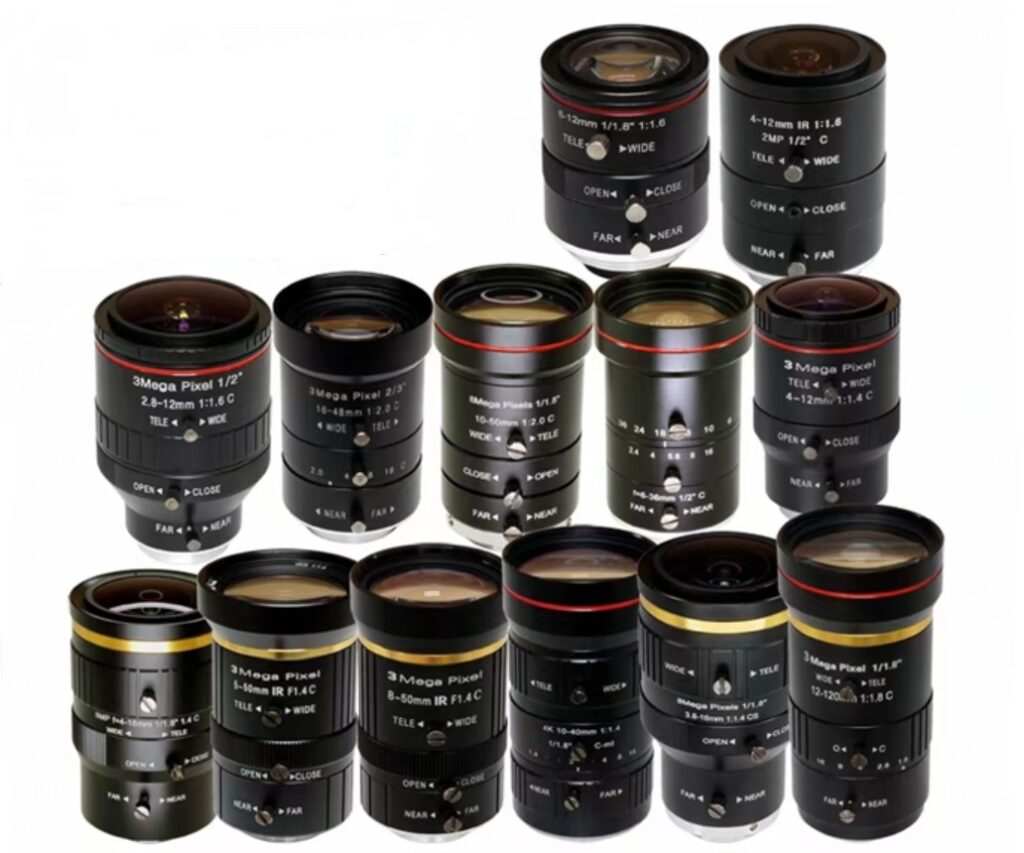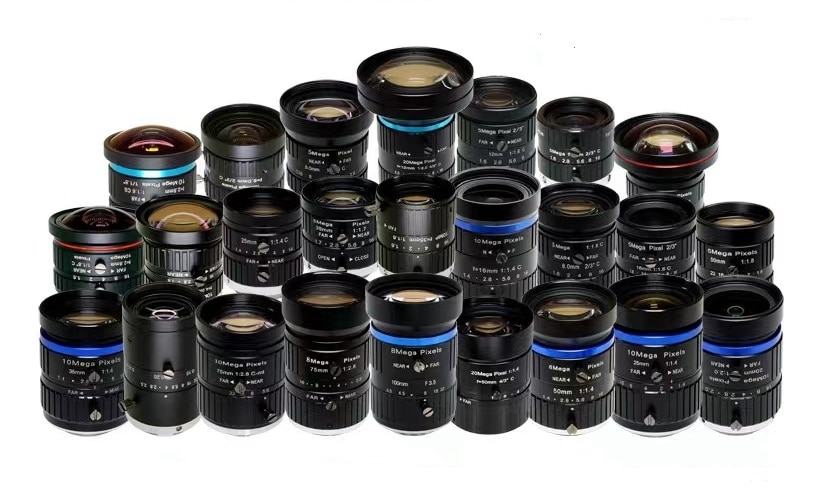Industrial processes rely on accurate data and precise measurements to achieve optimum performance. This data and measurements are given to the robots and machines to perform specialised tasks. Equipping these machines and robots with high-resolution cameras can significantly improve the accuracy and efficiency of an industrial process. These cameras not only improve the accuracy of measurements but also help in error detection and quality control.
Images and Videos captured by High resolution lenses offer great details and extreme clarity. Even in low light, these lenses provide sharp and colour-accurate pictures. A clear and sharp image helps to detect minor errors that may not be captured with a low-resolution lens. High-resolution lenses also have uses outside the industries. They are popularly used for high-end photography and for making movies.

Industrial Cameras Lens and High Resolution Lenses
Various types of Industrial Lenses and their Uses
Different industries have various working areas for which they use a variety of lenses. Some industries use high-powered lenses for precise 2-D measurements while others use fixed focal length lenses to monitor other processes. The following list contains the names and details of some widely used lenses in industries:
Telecentric Lens
- These are advanced lenses used to get precise and dimensionally accurate images. Telecentric lenses eliminate distortion and parallax error by providing consistent zoom on objects regardless of their distance from the camera. This lens also accurately measures the dimensions of objects without depending on their position and distance from the camera. A telecentric lens is used mainly in the automotive, aerospace, electronic and textile manufacturing industries.
Macro Lens
- Macro lenses are used to get close-ups of small objects to get fine details with their high magnification powers. They are used in industries for small parts inspection and quality control. These lenses are significantly useful for product/clothing photography, industrial inspection and research purposes where high magnification powers are required to capture small details.
Infrared Lens
- With the ability to detect and analyse thermal energy, infrared lenses have broad applications in different industries. They are used to measure temperature, night surveillance and medical inspections. Different industries that use infrared lenses are medical, scientific, military, and aerospace.
Fixed focus Lens
- This type of lens is used where there is a requirement for consistent imaging with high accuracy. Their main purpose is to provide quality control on the assembly line. They have a fixed focal length which works best when the object is placed at a constant distance from the camera. They are also quite cost-effective and easy to install and use.
How to Choose A Good Lens for Industrial Use
Choosing a good and appropriate Industrial Cameras Lens is very important for industrial processes. It is important to choose the right lens for the right purpose. There are different lenses and sensors available in the market, which can lead to confusion. The following points will help to select an appropriate industrial lens according to the user’s requirements.
CCD or CMOS
- CCD(charges-couples devices) are used in industries where high-quality images with accurate colour are crucial. They also perform better with low light. On the other hand, CMOS lenses offer efficient power consumption and high-speed image capturing.
Lens Type
- There are different types of lenses available for industrial use. Each lens has its own distinct optical features and uses. It is important to choose the lens carefully according to the requirement. For example, in the case of accurate magnification and precise measurement, a telecentric lens is way more beneficial than a traditional lens. Similarly, in other cases using a telecentric lens might be inconvenient and expensive like for personal use and CCTV surveillance.
Compatibility with the Camera Sensor
- Before purchasing a lens, ensure that it fits perfectly with the mount type(like C-mount, CS-mount or other mounts) of the camera. Choosing a suitable lens according to the sensor’s size results in improved-quality images.
Focal Length and Field Of View
- A lens’s focal length and field of view are important considerations before selecting the lens. While a lens with a shorter focal length provides a wider view, lenses with a longer focal length offer effective zooming on distant objects. A shorter focal length is generally preferred in industries where a large field of view is needed. On the other hand, for focusing on small parts from a distance, larger focal length lenses are significantly better.
Distortion
- For an industrial lens, precision and accuracy are the priority. Using low-quality lenses for industrial processes can lead to inaccurate measurement data, ultimately leading to errors and faults. For industrial use, the lens should produce distortion-free images so that the machine vision systems can get accurate data and measurements.
High Resolution or Number of Frames
- High-resolution videos generally have lower resolution. More storage and bandwidth are required for high-resolution footage with a higher framerate leading to extra hardware and more cost. Therefore, it is important to choose whether you need higher frame rate or better resolution before choosing an Industrial lens. Generally, lenses with high framerate are preferred in industries as they can effectively capture the movement of machines and assembly lines.
 What makes Industrial CCTV cameras Special?
What makes Industrial CCTV cameras Special?
Industrial security is a major concern because it has expensive machines, assets and sensitive data. Along with deploying security personnel, installing CCTV cameras is also important for increasing security. With modern technology, these CCTV cameras offer live footage as well as storage capabilities. This helps in providing 24/7 remote surveillance of the staff and processes. CCTV cameras are also commonly used in households, shops and small stores. However, CCTV cameras for industrial use come with some additional features.
Robust and Durable
- CCTV cameras used in industries should be durable and robust to work under harsh conditions. The industrial environment contains chemical fumes, high temperatures and dust particles. To survive and work in these conditions, industrial CCTVs have protective covers to increase their durability
Night Vision
- An industrial CCTV camera has a night vision lens that helps to detect movement in pitch-dark conditions. They use Infrared lenses or thermal imaging to get video footage in the dark.
High Resolution
- Industrial CCTVs use high resolution lenses to get clear and detailed footage. In addition to providing security, industrial CCTVs are used to monitor different industrial processes. It is important to capture every detail of these industrial processes to detect errors and quality control.
High-rated Waterproofing
- CCTV cameras for industrial use have an IP rating of IP66 or IP67 because they are generally placed outdoors. Industries have powerful water systems used for cleaning and other processes. Having a high IP rating also helps these CCTVs to survive accidental water jet pressure from any direction.
SuperiorCCTV a Trusted Name for Optimal Optical Solution
SuperirorCCTV is a trusted name for providing high-quality lenses. We know that having high-quality lenses proves to be a significant advantage for Industries. That is precisely why our research and development team puts extra effort into developing high-quality lenses. Also, our industrial lenses are tested under harsh conditions, so that they are durable enough for industrial use. We have invested more than 2 million dollars to create a dust-free optical workshop to make the best quality lenses.
Types of high-quality lenses we offer:
- Automotive
- Fisheye
- Infrared
- Machine vision
- Security camera
- Telecentric lenses and more
Also, in addition to these high-quality lenses, our professional team provides free consultancy about lenses and other optical components. This includes experience-based guidance regarding the best practices to follow during the installation of CCTV cameras and other lenses.
Conclusion
High-resolution lenses significantly improve the accuracy of industrial processes. These lenses provide high-quality images which help in quality control and error detection. There are various types of lenses used in industries including telecentric, infrared and macro lenses. All these different lenses have different uses and for better performance, it is important to choose a lens according to the requirement. Along with lens type, it is also important to consider the field of view, resolution and compatibility with the camera sensor.
